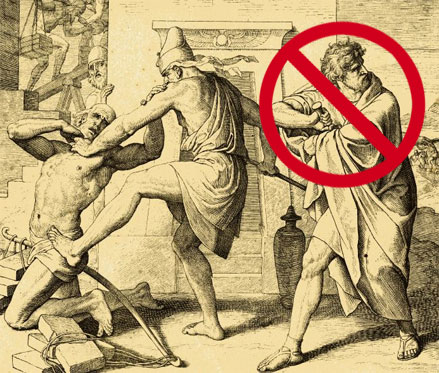Nov
30
2011
1 Peter 2:4-10 | Sermon Notes

Unfinished Business
6 For in Scripture it says: “See, I lay a stone in Zion, a chosen and precious cornerstone, and the one who trusts in him will never be put to shame.”
The first mention of a cornerstone is in Job 38. The Lord sees the Land as the foundation of His Temple. The entire structure reflects the Covenantal nature of the act of Creation.
Continue reading
1 comment | tags: Atonement, Hosea, Job, Justice, Justification, Peter, Solomon, Temple, Urim and Thummim | posted in Bible Matrix, Biblical Theology
Apr
13
2009

“And all Israel stoned [Achan and his family] with stones, and burned them with fire, after they had stoned them with stones.”
Questions from blogger Blue Ollie:
Many still claim to get their morals from the Bible. Well, what does the Bible actually say?
The following is a very incomplete list but is nevertheless a valid list.
1. How do you determine if someone is guilty? Answer: gamble.
Continue reading
1 comment | tags: Abraham, Achan, Atheism, Joshua, Justice, Lot, Sodom, Urim and Thummim | posted in Apologetics, Biblical Theology, Ethics
Apr
10
2009
Burning Bush
Things can look a bit different in hindsight, especially a presidential term or two.
To start with, Mr. Bush was right about Iraq. The world is safer without Saddam Hussein in power. And the former president was right to change strategy and surge more U.S. troops.
A legion of critics (including President Barack Obama) claimed it couldn’t work. They were wrong. Iraq is now on the mend, the war is on the path to victory, al Qaeda has been dealt a humiliating defeat, and a democracy in the heart of the Arab world is emerging. The success of Mr. Bush’s surge made it possible for President Obama to warn terrorists on Tuesday “you cannot outlast us.”
Mr. Bush was right to establish a doctrine that holds those who harbor, train and support terrorists as responsible as the terrorists themselves. He was right to take the war on terror abroad instead of waiting until dangers fully materialize here at home. He was right to strengthen the military and intelligence and to create the new tools to monitor the communications of terrorists, freeze their assets, foil their plots, and kill and capture their operators.
These tough decisions — which became unpopular in certain quarters only when memories of 9/11 began to fade — kept America safe for seven years and made it possible for Mr. Obama to tell the terrorists on Tuesday “we will defeat you.”
Full article by Karl Rove,
Bush Was Right When It Mattered Most
I hope the same can be said for his successor.
Comments Off | tags: Justice, Wisdom | posted in Ethics
Apr
10
2009
Was Moses a murderer?
 Moses’ execution of the Egyptian was “good death.” It was judicial. Moses had the authority to pass judgment and execute the sentence, and later became the judge of his people. “And Moses was instructed in all the wisdom of the Egyptians, and he was mighty in his words and deeds” (Acts 7:22). However, he rightly feared Pharaoh’s unjust reaction.
Moses’ execution of the Egyptian was “good death.” It was judicial. Moses had the authority to pass judgment and execute the sentence, and later became the judge of his people. “And Moses was instructed in all the wisdom of the Egyptians, and he was mighty in his words and deeds” (Acts 7:22). However, he rightly feared Pharaoh’s unjust reaction.
The Hebrews’ rejection of Moses as their judge condemned them to 40 years’ more slavery. They were at fault, not Moses.
Okay, so Moses did look this way and that, and buried the body in the sand. Yes, but the point was he feared Pharaoh’s reaction.
The Hebrews’ rejection of him as their judge condemned them to 40 years’ more slavery. Just as in the wilderness when Moses was their judge, it was the next generation that would be delivered. Moses was not condemned:
“The Bible never criticises Moses for this, but presents his action as righteous and faithful (Acts 7:24ff.; Heb. 11:24ff.). The execution of criminals is never said to defile the land, or to require atonement; such execution is itself the atonement required.” James B. Jordan, The Law of the Covenant, p. 254-5.
Moses’ judgment pictured the greater one to come upon the Egyptian taskmasters at his return—prefiguring Christ’s ministry in the first century.
Comments Off | tags: James Jordan, Justice, Moses, Typology, Wisdom | posted in Biblical Theology, Ethics
Apr
10
2009
Solomon’s New Broom
Solomon continued David’s role as redeemer/blood avenger. Like Ham’s attack on Noah, and Absalom’s sin on the roof, Adonijah’s request for one of David’s concubines was recognised as a grasp for the throne. Joab was judged for his shedding of innocent blood, and although he grasped the horns of the altar, refuge was lawfully denied (Numbers 35:15-19).1
The last priest of the house of Eli, Abiathar, was exiled before the Ark was given a permanent house. Like Gideon’s bull, the guilty “died” on the old altar before a new one could be established.
Solomon’s judicial execution of his father’s enemies was not paranoid. It was “good death.” The Lord always builds His house out of the corpses and plunder of His enemies. As death precedes resurrection, so discipline must come before joy (Hebrews 12:11) and Solomon’s actions here demonstrated his great wisdom as a judge.
______
1 “Why grasp the horns of the altar when you’re a fugitive in the temple? How is it legitimate to touch the horns, when the altar as a whole is forbidden to all but the priests? The answer to the first is found in the premise of the second: The altar is holy, and communicates holiness to anyone who touches it (if they aren’t holy already). When a fugitive grasps the horns of the altar, he becomes sanctified and hence inviolable. If found guilty, he will be killed (like Joab) because of a sacrilege; but if he is innocent, he protects himself with a taboo of holiness.” Peter J. Leithart, Horns of the Altar, www.leithart.com
Comments Off | tags: Absalom, Adonijah, David, Ham, Justice, Noah, Peter Leithart, Solomon, Wisdom | posted in Biblical Theology, Ethics
Apr
10
2009
Violence is not wrong
Over and over again when I read essays decrying “violence” I see no definition of the term. What it seems to mean is doing things another person does not like. So, spanking your child is violent because he does not like it. It is violent because it violates his person.
From a Christian standpoint this is idiocy. From a Christian standpoint sinful violence violates God’s integrity and the integrity of the innocent. Sinners deserve and need to be violated. God is all in favour of violating sinners, and will do so to some people in hell forever. God delights to punish the wicked (Deuteronomy 28:63) and though Jesus wept over Jerusalem in AD30, He was delighting to destroy her in AD70 (Psalm 69:21-28), because she had violated His Bride.
The exercise of violence is not a failure of the community, as some have asserted, because the Trinity does not fail and the Trinity will send some people to hell. Get used to it. It is blasphemy to suggest otherwise. Punishing criminals and spanking children does not reveal a mournful failure of community but is in fact the joyous privilege of maintaining community.
Violence is not wrong. Violence can be good, depending on who’s doing it and what the situation is. The psalms, which we are commanded to sing before God in worship, are full of violence. The only question in violence is who is being violated and why.
_____________
James B. Jordan, Evil Empire?, Biblical Horizons Newsletter No. 199, September 2008. Subscribe at www.biblicalhorizons.com
Comments Off | tags: James Jordan, Justice, Psalms, Wisdom | posted in Biblical Theology, Christian Life, Ethics
Apr
10
2009
Bad Death
“Anytime a judgment is passed on a situation, it means that situation or state of affairs, will be so radically altered as to virtually bring it to an end. It will be (in varying degrees and sizes) the end of one world and the beginning of another. One must be mature to deal in death, because passing a judgment always brings a death. And it is to this situation that Paul speaks when he says, “The spiritual man judges all things, but is himself to be judged by no one.”
If we refuse to judge when the necessary time comes, then we forestall the called for death and the cost increases. It never decreases. To live in appeasement of what should be judged is to make the final price of death far higher.”
From Rich Bledsoe, On Becoming A True Judge
http://biblicalhorizons.wordpress.com/2008/01/22/on-becoming-a-true-judge/
Comments Off | tags: Justice, Parenting, Rich Bledsoe, Wisdom | posted in Biblical Theology, Ethics
Apr
10
2009
The Mortification of Sin

Christ’s glory followed His victory in Gethsemane’s “Eden”.
When the Lord gave Adam the Law, He handed him a “scroll”—Adam’s mission. With clean hands and a pure heart, Adam could unseal and “look into it.” When the Lord returned, full of eyes, the scroll was open for blessing or cursing depending on Adam’s obedience. It was not the Lord who judged Adam, but the Lord’s words,unsealed at his “ascension” to headship over Eve, that judged him at the last day (of the week).
“If anyone hears my words and does not keep them, I do not judge him; for I did not come to judge the world but to save the world. The one who rejects me and does not receive my words has a judge; the word that I have spoken will judge him on the last day.” (John 12:47-48)
An open scroll brings testing. Adam’s disobedience opened his two eyes to his nakedness (Genesis 3:7), and the death of Passover (substitutionary animals). It opened his works to seven eyes of judgment—a cup of curses. Jesus’ obedience under testing brought Him glorification, the seven open eyes of the covered High Priest – the slain Lamb. Either we judge, or we are judged.
As Solomon, we put our “enemies” (sins) to judicial death (good death) as we mortify them (Romans 8:13; Colossians 3:5).
See also: Three Resurrections – 3: The Mission
[Solomon illustration from Barry Moser's illustrated King James Bible. Notice the round "firmament" over his head. Solomon sat enthroned between heaven and earth.]
Comments Off | tags: Culture, Justice, Solomon, Wisdom | posted in Biblical Theology
Apr
10
2009
Sacramental Doses of Death
Water, fire, salt and wine are symbols of judgment. In small quantities they bring life and keep death at bay (defilement). In large quantities, God uses them to destroy an irredeemable culture:
Syncretised sons of God (Gen 6) – water
Sodom – fire and salt (Gen 18-19)
The old Canaanite world, then Babylon – wine (Jer 25)
 For the church to be “salty” means it brings sound judgment to society. To lose its saltiness is the same as fire not being hot, or water not being cold. If we are not salty, we are lukewarm, and things that should be mortified in the church are not dealt with. Judgment begins at the house of God and flows to the nations.
For the church to be “salty” means it brings sound judgment to society. To lose its saltiness is the same as fire not being hot, or water not being cold. If we are not salty, we are lukewarm, and things that should be mortified in the church are not dealt with. Judgment begins at the house of God and flows to the nations.
In this context, the following words of James Jordan are not so shocking as they might otherwise appear:
The coming of the kingdom always involves the violent destruction of the wicked. When God announced the birth of Isaac, He immediately went out and destroyed Sodom (Genesis 18-19). These events are linked. The rescue of Israel from Egypt entailed the destruction of Egypt. The coming of the Spirit at Pentecost is followed by the slaying of Ananias and Sapphira. The New Covenant brought with it the horrors of AD70.1 Jesus is Kinsman Redeemer/Avenger. In Hebrew, redeem and avenge are the same word: ga’al.
Christians should rejoice at the privilege of bringing holy violence against the wicked and violating their plans and their wicked integrity. In union with Christ, who is both Redeemer and Avenger, Christians have both privileges. Serving in the Church, Christians extend redemption. Serving in the State, Christians extend Vengeance where necessary. The Christian serving as President of the USA should have Osama bin Laden captured and brought to Washington. Then, in front of television cameras from all nations of the world, the Christian President should smilingly blow bin Laden’s brains out, and publicly praise the Triune God for the privilege of doing so. Anyone who disagrees with this has no notion of what his baptism into union with Christ means.
A theology of indiscriminate “non-violence” is pure Satanism. It gives the world to the devil. In Christ we are now adults, and as adults we have grown-up responsibilities. One of those is the joyous privilege of exercising violence against the wicked.2
I have to say, I gulped hard when I first read this. But such a reaction shows how far out of step with Christ we are in our thinking. And such a judgment assumes we are already judging ourselves rightly with sacramental doses of water, fire, salt and wine and not hypocrites. The problem with the world begins with me.
_____________
1 Read Frederick Farrar’s summary here.
2 James B. Jordan, Evil Empire?, Biblical Horizons Newsletter No. 199, September 2008. Subscribe at www.biblicalhorizons.com
Comments Off | tags: AD70, Babylon, Communion, Compromise, Culture, Genesis, James Jordan, Justice, Wisdom | posted in Ethics
Apr
8
2009
In Hebrew, vindication and redemption are one word. When Job was confident that his redeemer lived, he was looking forward to his vindication against his “comforters.”
Jesus’ words against the Temple hung over Jerusalem for a generation, and would be vindicated despite Herod’s obsessive glorification of his graven image. Its completion in AD64 was taken as proof that Jesus was indeed a false prophet.
Christ came in judgment as He promised and the Temple was destroyed. Vindication and redemption came in one event, and new worship would be born through the death of the old.
“The pagan view of law is that justice is a balancing of the scales. The biblical view of law is that justice is transformational.”1
The death and resurrection of Israel in Christ as the head would be measured out in the people of God as the body. God’s Word brings division that leads totransfiguration. His justice always has one eye on the future.
1 James B. Jordan, Preterism vs. Gnosticism [lecture]. Available from www.wordmp3.com
Comments Off | tags: James Jordan, Job, Justice, Temple, Vindication | posted in Biblical Theology, Ethics






























